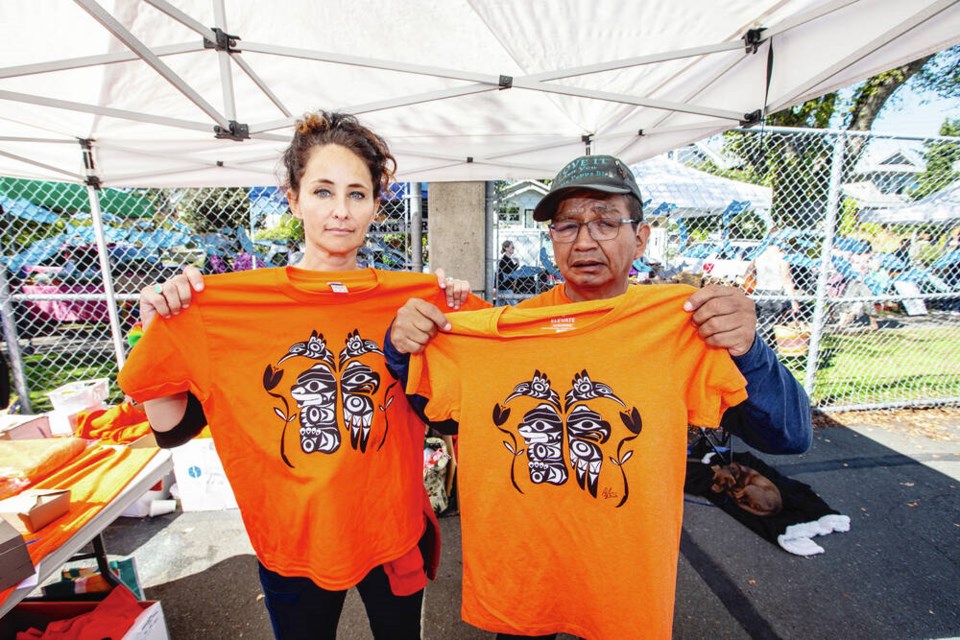With so many online sellers ripping off the designs of Indigenous artists to sell merchandise for Orange Shirt Day on Sept. 30, artists are cautioning people to ensure they buy from a source that supports residential school survivors.
The knock-offs have become so prolific that blank orange shirts have become difficult to source across the country as companies without Indigenous ties buy them in bulk to profit “off the suffering of residential school survivors,” said Kristin Spray, who organizes an annual Orange Shirt Day event in Centennial Square with residential school survivor, Eddy Charlie.
Spray and Charlie sell shirts with a design by W̱SÁNEĆ artist Bear Horne through their website and several local businesses. Spray said about 10 different outlets have stolen the design, even altering the colours and removing Horne’s signature from his work, and she knows many artists have experienced something similar.
Charlie said he finds it “outrageous” that companies are ripping artists off for profit, without providing any proceeds to survivors or create awareness.
“They’re not even talking about what the design means or why residential schools are important to speak about,” Charlie said.
For those looking to buy a shirt for Sept. 30, Spray and Charlie recommend asking the seller who the artist is and where the proceeds from sales go. If there’s any uncertainty, Spray suggests contacting artists directly to ask where they’re selling their shirts. The process can also lead to new connections and learning more about the artist’s work, she said.
“They’re not just designs. A lot of the designs on shirts are also stories. And artists have an important place to share about these stories when there’s trust in place or connection is made,” Spray said.
Proceeds from orange shirts and other merchandise Spray and Charlie are selling go to toward the cost of organizing the annual event, including paying survivors who share their stories, Indigenous leaders who give land acknowledgements and say prayers, as well as year-round work by Spray and Charlie to raise awareness. The shirts with Horne’s design can be purchased online through victoriaorangeshirtday.com, at Moss Street Market on Saturdays, and at Island businesses, including Cafe Fantastico on Quadra, Discovery Coffee and Victory Barbers and Brand. A full list is available on the event’s web page.
Nuu-Chah-Nulth artist Art Charlie is selling his own design on T-shirts in stores downtown, including Spirit of Victoria, Moose Crossing, Cedar Moon and Northwest Origins, where he is an assistant manager.
The shirts come with a short biography of Charlie and a description of the design, which features a wolf, eagle, raven and bear around a moon, a symbol of protection and transformation,” he said.
Charlie receives one dollar from every shirt sold, with the rest going to the Orange Shirt Society and Indian Residential School Survivors Society.
The University of Victoria is selling shirts with a design by Kwakwaka’wakw artist Carey Newman at their bookstore. Profits go to Newman’s Witness Blanket project, the Orange Shirt Society and Elders Engagement Fund.
The Royal B.C Museum gift shop also sells Orange Shirt Day shirts, with proceeds going to the Orange Shirt Society and B.C. Aboriginal Child Care Association.
Shirts can also be purchased directly from the Orange Shirt Society, a non-profit organization created to create awareness of the intergenerational impacts of residential schools.
- - -
To comment on this article, send a letter to the editor: [email protected]



